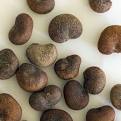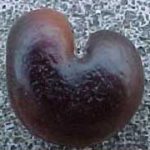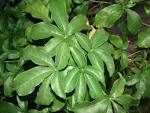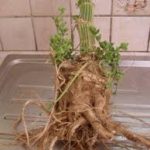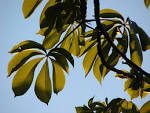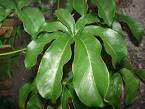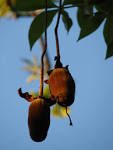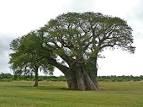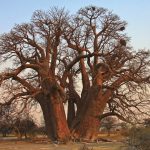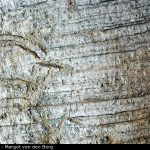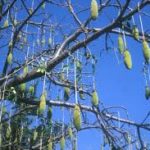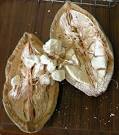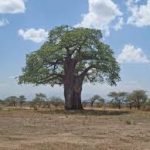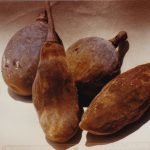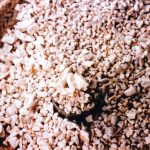Adansonia digitata L.
Uses
Africa (west): young, tender roots are edible. Pulp of fruits used for food and food seasoning. Acid pulp of fruit used by some pastoral tribes to curdle milk in the manufacture of kwatakwari. Young leaves eaten in soup, and as a pot herb. Seeds eaten as food and mixed with millet (Panicum miliaceum) to produce a thin gruel. Seeds also used in preparation of a beverage and eaten as a famine food after pounding. In Senegal, the bark is eaten and the dried leaves are used as a condiment. Kenya (Mbeere division, Embu district): young leaves used as vegetable relish as start of rainy season; (semi-arid south-east): thick roots terminate in clusters of potato-like tubers which are cooked and eaten. Roots of germinated seeds can also be eaten. Zimbabwe: fruit pounded to extract the pith which is then cooked either alone or mixed with maize meal, into a thick porridge. Sudan (Kordofan, Darfur): green leaves mixed with Tamarindus indica fruit pulp; dried leaves used as waika, a traditional Sudanese dish; pulp used a beverage base; made into a porridge (nesha), by mixing the pulp with milk. Unripened fruits boiled and eaten as a salad. Malawi: fruit eaten. Nigeria (Kano State, northern): leaves, seeds, pod pulp, green fruit, young roots, bark eaten. Mozambique (Macossa and Tambara districts): fruit pulp boiled and thickened with maize (Zea mays L.) meal or other powder [sic] and eaten as porridge. Seeds boiled and eaten like nuts [sic]. Leaves cut into small pieces and boiled to make derere, a relish, The outer husk or rind of the fruit is burned to ash, which is added to the derere to give it a salt-like taste. Niger (Niamey). Mali (Koutiala). Leaves used primarily as a condiment and in soups. (Tilalaberi): fruit eaten.
Chemical composition ((Nigerian sample)L leaves (sun-dried): rich in calcium, containing 3.6% calcium oxide, potassium tartarate, common salt and tannin. Acid composition of seed oils : Oil = 15%. Fatty acid composition – 14:0 = trace. 18:0 = 5%. 18:1 = 33%. 18:2 = 29%. Cyclopropenoid acids (as sterculic [HBr-acetic acid in benzene]) = 7%. ‘
Chemical composition (Sudan sample, after Abdelmuti): Protein (crude) = 3.1% (dry). Fat = 0.5% (dry). Fibre (crude) = 9.2% (dry). Ash (insoluble) = 5.8% (dry).Carbohydrate (soluble): Starch = 15.3% (dry). Sucrose = 19.3% (dry). D-gluose = 0.6% (dry). D-fructose = 5.6% (dry). Amino acids (g [16g N]-1): Aspartic acid = 9.8g. Threonine = 5.2g. Serine = 5.9g. Glutamic acid = 10.1g. Proline = 7.5g. Glycine = 5.5g. Alanine = 5.2g. Valine = 5.2g. Cysteine = 1.3g. Methionine = 1.3g. Isoleucine = 4.2g. Leucine = 6.8g. Tyrosine = 3.3g. Phenylalanine = 4.2g. Lysine = 4.6g. Histidine = 1.6g. Arginine = 4.6g. Minerals: Sulphur = 0.13% (dry). Potassium = 0.06% (dry). Magnesium = 0.14% (dry). Calcium = 0.36% (dry). Na = 0.01% (dry). K = 2.57% (dry). Zinc = 13mg/kg -1 (dry). Iron = 17mg/kg-1 (dry). Manganese = 8mg/kg-1 (dry). Copper = 8mg/kg-1 (dry). Aluminum = 10mg/kg-1 (dry).
Chemical composition (Mozambique sample): fruit pulp: Protein = 2.2g/100g. Fat = 0.8g/100g. Carbohydrate = 76.7g/100g. Calcium = 284mg/100g. Phosphorus = 118mg/100g. Iron = 7.4mg/100g. Vitamin A = 70mcg/100g. Vitamin B2 = 44mg/100g. Vitamin C = 270mg/100g. Citric acid = 4.4%. Fruit pulp porridge (without grain added): Protein: 6.6g/100g. Fat: 0.3g/100g. Carbohydrate = 81.5g/100g. Calcium = 300mg/100g. Phosphorus = 143mg/100g. Iron = 2.6mg/100g. Vitamin B2 = 2.29mg/100g. Leaves (raw): 3.8g/100g. Fat = 0.3g/100g. Carbohydrate = 16.1g/100g. Calcium = 402mg/100g. Phosphorus = 65mg/100g. Vitamin C = 52mg/100g. Leaves (dried): Protein = 12.3g/100g. Fat = 3.1g/100g. Carbohydrate = 63.2g/100g. Calcium = 2.241g/100g. Phosphorus = 275mg/100g. Iron = 24.0mg/100g. Vitamin A = 9.7mcg/100g. Vitamin B = 5.3mg/100g. Vitamin C = negligible.
Amino acid values and protein quality compared with FAO reference protein (values in mg amino acid /g N), of dried leaves (Mali sample) – from Nordeide:
Isoleucine = 293 Leucine = 501 Lysine = 293 Methionine = 57 Cysteine = 170 Phenylalanine = 308 Tyrosine = 215 Threonine = 300 Tryptophan = 105 Valine = 300 Histidine = 130
Additional Information
- Vernaculars:
- Kikuyu: Mu-ramba, Baobab. Sudan - Arabic: Tebeldi. Nigeria - Hausa: Kuka. Kanuri: Kuka. Mozambique (Manyika/Shona]: M’lambe
